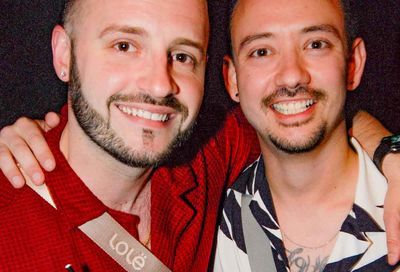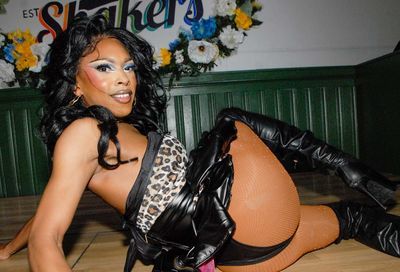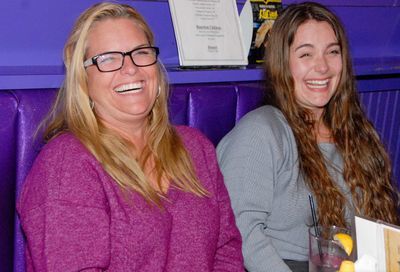Sissy Fuss
A memoir of growing up different in the South, 'Mississippi Sissy' is full of moments that don't quite create a whole
A freak and a sissy. Not to mention an orphan and, most challenging, a Southerner.
Such was the childhood of Kevin Sessums, best known for his celebrity profiles that have graced the pages of Vanity Fair for years. Having moved on to more Allure-ing pastures, Sessums turns the spotlight into the mirror and examines his own past in Mississippi Sissy.
For a man who has interviewed personalities ranging from Barbra Streisand to Angelina Jolie, his memoir contains no celebrity dish. Rather Sessums focuses on growing up in Mississippi where, having lost both parents by the time he turned 8, he was labeled a sissy from day one. It’s this label, this ”feeling different,” that is the central focus of Sessums’ story. For many in the gay community, it’s a familiar feeling. This time, it’s just described by someone with a strong command of the English language. Otherwise, Mississippi Sissy () brings very little new insight to the gay experience.
Known for being able to elicit the most private details from stars, Sessums ably doles out his own past; the problem is that it’s just not that engaging. Each chapter of Sessums’ memoir is titled after famous celebrities who figured prominently in his life — sometimes directly, but most often from afar. In this vein, it’s similar to a compilation of his Vanity Fair articles. Each chapter contains the information needed to flesh out the theme of his story, regardless of linear time. While these tangents can be used effectively, they can also cause the equivalent of time travel seasickness.
To be sure, Sessums grew up in interesting times. The assassinations of Martin Luther King Jr., John F. Kennedy and Robert Kennedy, Sidney Poitier’s Oscar win, Woodstock, and many other pivotal events form the cultural backdrop for his youth. Naturally, growing up in the South, the civil rights movement also plays a central role as Sessums tries to balance his own feelings of displacement from the norm with the discrimination of the African-American people in his life.
The most painful stories that Sessums shares are the most beautifully handled: the death of his father, followed shortly thereafter his mother, his abuse at the hands of a trusted pastor, and a disastrous Halloween that forever cemented his sissy status. These are all told with vivid clarity and heartbreaking detail — diamonds in the rough.
One of the best stories he recounts is his attempt to pick cotton for a day on a relative’s farm. The family’s maid, who helped raise Sessums but returned to picking cotton, is one of the most lovingly and painstakingly drawn people in the book. Matty May’s disappointment and ultimate rejection of Sessums is heartbreaking and well captured.
Advertisement
|
However, it is the mortar between these brilliant moments that crumbles. Some scenes are unnecessarily long and drawn out, while others are just oddly placed. For example, one story in which Sessums, his boyfriend at the time, and a number of prominent local figures enjoy dinner together is dragged out to great length with the conversations recounted in excruciating detail. Just when you start to wonder why this evening matters, Sessums writes, ”That night, that song, those lyrics, those women, those dear two Franks, that moment I turned from the sink and glimpsed pure joy for a second or so has echoed throughout my life.” Those little moments that mean so much can be the hardest to capture, even by the best writers. Unfortunately, Sessums does this moment little justice by recounting the hours of dialogue that precede it.
Sessums ultimately resorts to using hooks and clues to prompt his readers to continue. In fact, the book opens with him ”fleeing” the scene of a horrible murder. Vague passing references to this death are laced throughout the book, but they read more like teasers rather than tragic foreshadowing. Likewise, a secret shared between him and his father is dangled like a carrot before the readers until the end when, once revealed, it turns out to be oddly predictable and unsatisfying.
Mississippi Sissy — like Vanity Fair — should be skimmed for the best parts. Otherwise, it’s a lot of flipping through endless pages of dialogue waiting for the next big event to take place. Sessums is a gifted writer who uses his skills to great effect in telling his story. However, his celebrity profiles aren’t book length for a reason.
There’s a lesson in that.
Support Metro Weekly’s Journalism
These are challenging times for news organizations. And yet it’s crucial we stay active and provide vital resources and information to both our local readers and the world. So won’t you please take a moment and consider supporting Metro Weekly with a membership? For as little as $5 a month, you can help ensure Metro Weekly magazine and MetroWeekly.com remain free, viable resources as we provide the best, most diverse, culturally-resonant LGBTQ coverage in both the D.C. region and around the world. Memberships come with exclusive perks and discounts, your own personal digital delivery of each week’s magazine (and an archive), access to our Member's Lounge when it launches this fall, and exclusive members-only items like Metro Weekly Membership Mugs and Tote Bags! Check out all our membership levels here and please join us today!
























